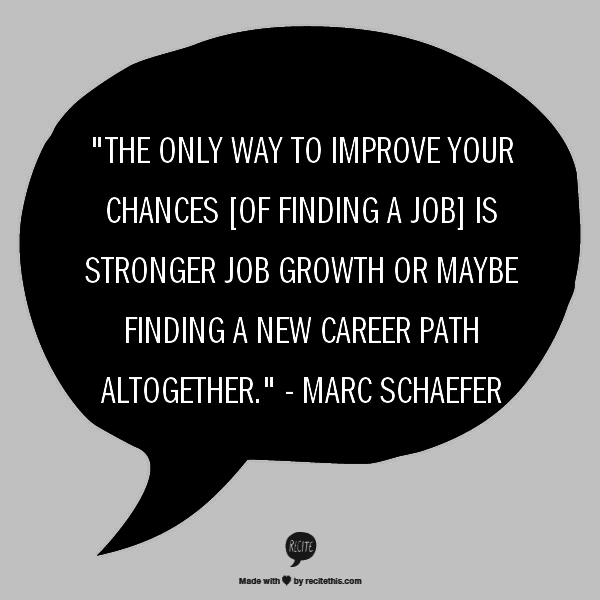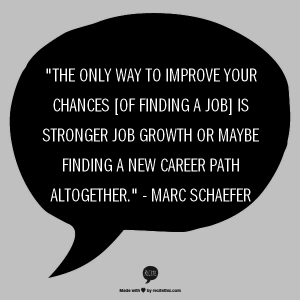Overall, the job market is getting better. Slowly getting better, that is. Personally, I’ve been having more job interviews in the last 6 months than anytime time period since I was let go from my full-time job in 2010. Last Friday, there were signs that more discouraged workers that were once sitting on the sidelines were now re-entering the workforce. The competition for jobs, however, is still a concern. As of May, there is still an average of more than 2 unemployed people per 1 open position. If you factor in people with jobs, career fields and regional markets, that number is actually higher. With more people entering the workforce, that ratio may not fluctuate much in the coming months.
Anyone who’s been out of his or her career field for a long time knows how competitive the job market has been. When you apply for an open position at a company, there’s always a hierarchy of candidates that hiring mangers have to consider:
- Internal candidates with similar experience
- External candidates with similar experience who have a job.
- External candidates with similar experience who have been out of work less than 3 months.
- External candidates with similar experience who have been out of work less than 6 months.
- External candidates with similar experience who have been out of work more than 6 months.
And then somewhere at the bottom near #1000:
External candidates with no relevant experience who might just be trying to fill a job search quota for unemployment compensation.
Technically, I’m at #5 in this pecking order. I’m under-employed, but I have not found any (non-volunteer) work in my career field for over 6 months. This is something I have come to realize shortly after the completion of even the most successful interviews. Recently, I interviewed for a full-time position at a media company involved with theatrical program distribution. I got my interview suit dry-cleaned. Went to the barber for a trim (and to de-emphasize my gray hair). Did all my research regarding the company. Prepared all kinds of questions I might be asked. Come time for the interview, I was ready. Spoke with confidence with the hiring manager. After it was over, I felt I had a very good shot at the next round of interviews.
A week later, I got an email on a Friday afternoon from the hiring manager. He thanked me personally for coming in to talk and that I had “great qualities and a professional attitude” but he added, however, that “we will be going in a different direction and will not need your services at this time.” When I asked a follow-up question regarding what key characteristic the other favored candidates had that I may have been lacking, his reply included this cryptic sentence:
“There are a set of individuals with similar attributes and experiences similar to yours that are currently more ingrained in our industry that make for a better fit.”
In others words, I was being passed over because I wasn’t a #1 or #2 on the Job Applicant Hierarchy. Even in this slow job recovery, being a #5 sometimes feels like being all the way down to number #1000. The only way to improve your chances is stronger job growth or maybe finding a new career path altogether. I’m at a point where I may have to choose the latter option.
We’ll see.
What do you think of the job hierarchy? Who really gets the job you are interviewing for?
You can read more about Marc Shaeffer and is job searching journey by visiting his blog at http://laboringtowork.weebly.com.


I am with on the job hierarchy I have been applying for jobs for the past 8 months for various forms of work be it part time, full time, seasonal, etc. This post does have me wondering who has been getting the jobs I have been applying for though in the first place.
Marc hit it right on the head. Many hiring managers and business, whether they admit it or not, have this hierarchy. And the big thing is that (as one of the previous guest bloggers mentioned) getting a new job is really expensive. I would be curious to learn more on Marc’s thought on doing “holdover” jobs that can hold a person over until a stronger, more long term, full time work presents itself.
Thanks for the reply. I think “holdover” jobs are definitely worth it, provided that the job will lead to other opportunities either within an organization or within an industry. A key factor to consider is time. If after say 6 or 12 months, those opportunities don’t arise or management doesn’t recognize your contributions to the organization, it might be wise to take a different path.
Unemployment is leprosy. Don’t believe anything else.
Employers see you this way.
(As an aside, on top of the treatment from employers, friends will disappear, and even some family members will start to shun you. Stay sunshine positive at all times, or you will lose friends and family at a faster rate.)
I would like to add a 3A or 4A to your list/ranking.
What I did was transition to being self-employed after a few months of being out of work by getting small (paid) projects, but I know that I am still being looked at skeptically by potential employers. I could list the professional rosters and projects that I am undertaking, but unless it is FT regular, I am irregular.
The thought goes something like this.
“I mean, if you aren’t at a company desk 8-6 every day doing company work, what in the world is wrong with you?”
Thankfully, I just don’t care what employers think. They aren’t hiring anyone right now anyways. They are stringing people along, and grinding people through their meat grinder-like processes.
Still, don’t put up with this.
Just say “You’ve gotta tell ’em! SOYLENT GREEN IS PEOPLE! ” in your best Charlton Heston voice, and worry about finding a way to do things that make profit and solve other peoples’ problems. You don’t need multiple HR screen phone calls and personality tests to talk shop with former colleagues and people from your professional network.
Eventually places will actually have to fill positions, and by then a positon will open up where you’ll have an ‘in’. Or, you’ll be too busy juggling too many projects for 4-5 different clients that you don’t want to shackle yourself to a regular job again.
Happy Labor Day
I like your point of view – and friends and former colleagues are ready to ditch the second the stench of need is in the air, here’s hoping we don’t have to worry about those regular jobs in the future!